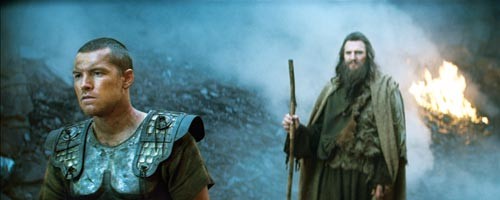Why can't gods and humans get along? For that matter, why can't gods -- gods! -- play nicely together? But bad behavior abounds, from the celestial domain of the immortals all the way down to the grubby ground upon which peevish humans toil -- and deeper still to the underworld, which houses the truly disgruntled.
And so we have Clash of the Titans, which depicts a pivotal chapter of ancient warfare between the gods, mortals, semi-mortals and just plain freaky things.
Louis Leterrier's action adventure is based on the 1981 film of the same name, and both works draw from Greek mythology. (Students should note that this film is no substitute for reading the assigned material.)
Our hero is Perseus, adopted son of a humble fisherman. Unbeknownst to him, Perseus' real daddy is none other than the god Zeus, who settled an earlier dispute with a human by bedding that man's wife, who then bore Perseus. (This sort of behavior is more dog-like than god-like.)
But Zeus has troubles beyond the purview of a mid-week Jerry Springer episode. His mortal subjects are opting out of adoring him and the other Mount Olympus deities. And his fellow god Hades, who got stuck running the very depressing underworld, has a dubious plan to win humans back by terrifying them with a monstrous creature he has created, called the kraken.
Through a series of convenient skirmishes, and the intercession of a beautiful adviser named Io (Gemma Arterton), Perseus embarks on a quest to right the balance between man and god. He travels with a small but battle-hardened crew of soldiers led by the grizzled Draco (Mads Mikkelsen).
The key to restoring order, obviously, is subduing Hades. But, as is wont to occur in old Greek stories, the path is littered with other, no less perilous obstacles and challenges: giant scorpions, lighthearted mercenaries, the uncertainty of Io's affections and a lady with a head full of snakes. And, of course, there's Chekov's kraken, which is sure to turn up by the final act.
This is pretty junky entertainment, but likely what viewers are expecting. Character development is strictly one-dimensional, and the storytelling perfunctory. We start with a brief voiceover outlining the major characters and the brewing crisis. From there, the tale unfolds quickly, with lots of just-because circumstances. (For example, the faceless scorpion people tell Perseus about the eyeless witches, who then tell him about how to defeat the kraken, and so on.) But the film moves at a good clip, so as long as swords keep clanging and the CGI beasties keep threatening, the experience remains mostly amusing.
The 1981 film was notable as the final feature-length project of famed stop-motion animator Ray Harryhausen. Today, viewers get lots of computer effects -- the monsters are fairly realistic, but the backgrounds often look painfully fake. Some theaters will screen the film in 3-D, though there's no fresh ground broken with that technology. (The film was bumped up to 3-D, and not expressly produced for it.) It will likely be the same silly thrill ride in 2-D (as well as cheaper).
I couldn't help noticing, though, that the characterization of the leads seemed very familiar. Perseus is played by Sam Worthington, last seen in Avatar engaged in a similar noble mission to bridge the gap between religion and Joe Sixpack. (Here he is less blue and has upgraded his warrior thong to a metal miniskirt with matching breastplate.) Zeus, outfitted in the silvery-satiny togs preferred on Olympus, is portrayed by a leonine, bearded Liam Neeson; the effect is a cross between the big cat-Jesus figure Neeson voiced in The Lion, the Witch and the Wardrobe and a Saturday Night Fever-era BeeGee. The hissing, malevolent Hades is played by the smoke monster from Lost ... no, wait, Lord Voldermort ... um, I mean, Ralph Fiennes.
Those familiarities just bemused me. I do, however, wish I hadn't already seen the kraken -- the real "star" of the film -- in countless trailers and TV commercials. There are few surprises in this film as it is. Given that the entire story builds to a showdown between the kraken and Perseus, couldn't we at least be vicariously awestruck by this monstrosity when it finally emerges from beneath the sea?















